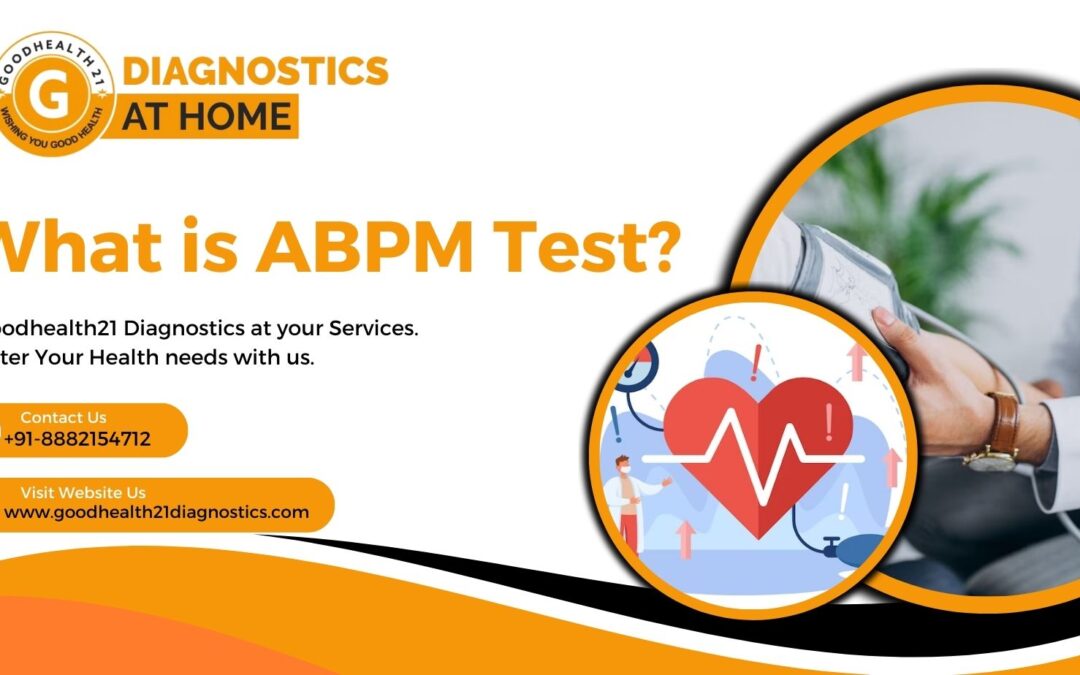What is ABPM Test and When and Why Should I Take This?
In the world of medical diagnostics, numerous tests are available to assess various aspects of our health. One such test that has gained importance in recent years is the Ambulatory Blood Pressure Monitoring (ABPM) test. Goodhealth21 Diagnostics is here to shed light on what is ABPM test and when and why you should consider taking it.
What is ABPM Test?
ABPM, or Ambulatory Blood Pressure Monitoring, is a diagnostic procedure that tracks your blood pressure over a 24-hour period. Unlike traditional blood pressure measurements taken at a clinic, ABPM provides a more comprehensive view of your blood pressure throughout your daily activities and during sleep.
Here’s how the ABPM test typically works:
- A small, portable device is worn on your arm, usually attached by a cuff.
- The device is programmed to automatically inflate at specific intervals throughout the day and night.
- It records your blood pressure measurements over the entire 24-hour period.
- You are required to keep a diary of your daily activities and sleep schedule during the test to help correlate the data with your daily routine.
The ABPM device provides a wealth of information, including average blood pressure, blood pressure fluctuations, and the impact of different activities on your blood pressure. This detailed data can be invaluable for both diagnosing and managing hypertension and other related health conditions.
When Should You Consider ABPM Testing ?
Now that you have a basic understanding of what the ABPM test is, let’s delve into when and why you should consider taking it
1. Suspected Hypertension: If you or your healthcare provider suspects you have high blood pressure (hypertension), ABPM can provide a more accurate diagnosis than occasional office-based measurements. It can help determine whether your high blood pressure is sustained or merely a result of “white coat syndrome” (elevated blood pressure due to anxiety in a clinical setting).
2. Evaluating Blood Pressure Medications: For individuals already diagnosed with hypertension, ABPM can help assess the effectiveness of prescribed medications. It provides a comprehensive picture of how well your medication is controlling your blood pressure throughout the day, ensuring that adjustments can be made as needed.
3. Masked Hypertension: Some people have normal blood pressure readings in clinical settings but experience elevated blood pressure outside of the doctor’s office. This phenomenon is known as “masked hypertension.” ABPM can identify such cases, helping to prevent potential health risks that might otherwise go unnoticed.
4. Resistant Hypertension: In cases where blood pressure remains high despite multiple medications, ABPM can provide crucial information about the effectiveness of the current treatment plan. This data can guide healthcare professionals in adjusting medications or exploring alternative treatment options.
5. Evaluating Cardiovascular Risk: Beyond diagnosing and managing hypertension, ABPM can also be used to assess an individual’s overall cardiovascular risk. High blood pressure is a significant risk factor for heart disease and stroke, and detailed data from ABPM can help tailor preventive strategies.
6. Monitoring During Pregnancy: Pregnant women with pre-existing hypertension or at risk of developing high blood pressure during pregnancy may undergo ABPM to monitor blood pressure changes over time. This can help manage the condition and ensure the well-being of both the mother and the baby.
7. Research and Clinical Trials: ABPM is frequently used in medical research and clinical trials to gather data on blood pressure trends in various populations and to assess the impact of treatments or interventions.
Why Choose ABPM over Traditional Blood Pressure Measurements?
Now that you understand when you should consider ABPM testing, it’s important to grasp why it’s often preferred over traditional blood pressure measurements taken in a clinic:
1. Comprehensive Data: ABPM provides a more complete and accurate picture of your blood pressure patterns throughout the day and night, capturing variations that might be missed during occasional clinic visits.
2. Reduced White Coat Syndrome: Many people experience anxiety or nervousness when visiting a healthcare provider, leading to temporarily elevated blood pressure readings. ABPM eliminates this issue by continuously monitoring blood pressure in a familiar environment.
3. Better Diagnosis: For conditions like masked hypertension and resistant hypertension, ABPM is often the most reliable method for diagnosis and treatment evaluation.
4. Improved Treatment: ABPM allows healthcare professionals to tailor treatment plans more effectively by identifying specific blood pressure patterns and trends. This leads to better control of hypertension and reduces the risk of complications.
Final Word
In the realm of medical diagnostics, the ABPM test stands as a valuable tool for assessing blood pressure. It provides a holistic view of an individual’s blood pressure patterns over 24 hours, aiding in the diagnosis and management of hypertension and related conditions. Understanding when and why to consider ABPM testing is essential for maintaining good health.
Whether you suspect you have high blood pressure, need to evaluate the effectiveness of your current treatment plan, or are looking to assess your cardiovascular risk, ABPM can offer valuable insights that can ultimately lead to better health outcomes. Goodhealth21 Diagnostics encourages you to consider this test as a proactive step in managing your well-being.
Remember, regular check-ups with your healthcare provider are essential for maintaining your health, and ABPM can be an invaluable addition to your diagnostic toolkit. Prioritize your health, and take steps to ensure a healthier, happier future.

